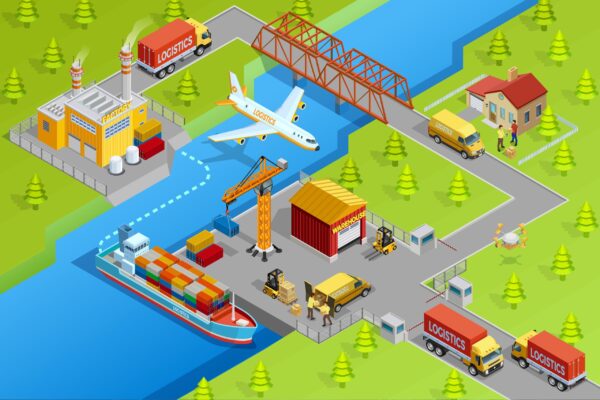8 Essential Logistics Terms You Should Know
Logistics can seem tricky with all its terms. You need to know keywords to succeed. Understanding logistics services helps your business run smoothly.
It also saves time and money. Today, we will talk about important logistics terms in simple words, and you will learn how supply chain management works.
Well, let’s dive into the basics so that you can understand a little more about this industry.
What Is a Supply Chain?
A supply chain moves products to customers. You start with raw materials, and then you make and deliver goods. Well, this is because many steps are involved.
Supply chain management connects suppliers and retailers. It also includes warehouses and transport, as it is a big process.
Key Parts of the Supply Chain
Raw Materials
You gather items like steel or cotton, and suppliers provide these to factories. This is because products need a start, and it’s the first step.
Production
You turn materials into products, and factories assemble and pack goods. That’s why quality matters here, and this is how items are made ready for sale.
Delivery
You move products to stores. Trucks or ships handle transport. This is because end-to-end logistics ensures speed, and customers get goods fast.
Bill of Lading
A Bill of Lading is a key document, and you use it when shipping goods. It lists what’s in the shipment and also shows where it’s going. This is because it acts like a receipt. Logistics services rely on it for super important tracking. Well, it keeps things clear.
Through BOL, you can show that goods were sent. It protects you if issues arise, as it’s legal proof and a document of trust.
You know who gets the goods as it names the consignee and it avoids mix-ups. Thus, delivery stays smooth.
FCL vs. LCL Shipping
FCL means Full Container Load, and LCL means Less than Container Load. You choose based on shipment size, as FCL fills a whole container and LCL shares space with others. This is also because size affects cost. End-to-end logistics helps pick the best option and helps you save money.
FCL is used when you ship a large volume, as it’s faster and more secure. It is cost-effective for big loads.
LCL is used when you ship smaller amounts, as it’s cheaper for less cargo. That’s why it’s great for small businesses and helps you avoid extra costs.
TEU and FEU
TEU means Twenty Foot Equivalent Unit, and FEU means Forty Foot Equivalent Unit. It is used to measure container sizes. Well, TEU is for 20-foot containers and FEU is for 40-foot ones.
You know how much it fits, and it helps plan cargo space. Also, measurements are universal, and they avoid confusion.
When you estimate shipping costs, bigger containers cost more. Thus, TEU and FEU matter as budgets stay on track.
3PL Logistics
3PL means third-party logistics. It is a company that you hire to handle shipping. They manage warehouses and deliveries, and also save you time.
Supply chain management uses 3PL for efficiency and helps you focus on your business.
You let experts handle logistics, and it frees up your day. They know the process inside out, and this boosts efficiency.
You avoid buying trucks or warehouses as 3PL shares resources. It’s budget-friendly, and you grow faster.
CIF and COGS
CIF means Cost, Insurance, and Freight. You pay for shipping and insurance. COGS means Cost of Goods Sold. It covers making your product. This is because both affect profits. End-to-end logistics tracks these costs. That’s why they’re key terms. Thus, you price products right.
CIF is when you cover the sea shipping costs. Buyer handles import fees. This is because it’s a trade term. Well, it simplifies international deals.
COGS means when you track material and labor costs. It shows your profit margin, and this is the reason why it’s a vital metric.
Landed Cost
Landed cost is the total product cost. You include the purchase price and shipping fees. It also covers taxes and duties. This is because all costs add up. Logistics services help calculate it accurately. Well, it affects your pricing.
You set prices to cover costs to prevent losses. This is because you know all expenses, and it keeps profits safe.
You predict costs with freight partners. It avoids surprises. That’s why supply chain management tracks it, and you budget wisely.
Consignee
A consignee receives the shipped goods. You are often the consignee as the buyer. It could also be your agent. This is because someone claims the cargo.
End-to-end logistics names them in documents, and it ensures smooth delivery. That’s why it’s a key term. Thus, shipments reach the right person.
You sign for the shipment, and it confirms that delivery has occurred. This is because proof is needed as it avoids disputes.
Cargaison: Best logistics services
Logistics terms are vital for success, and making informed choices is enhanced with knowledge. Logistics services keep your business moving fast.
Cargaison Express offers end-to-end logistics to simplify things. Well, understanding terms saves time and money.
Also, clarity drives efficiency, and this is why you should learn them.
FAQs
What is supply chain management?
It’s managing the flow of goods, and you connect suppliers to customers.
What does the bill of lading do?
It’s a receipt for shipped goods and helps you track shipments and ownership. Well, it’s a key document.
What’s the difference between FCL and LCL?
FCL is a full container, and LCL shares container space.
What is landed cost in logistics?
It’s the total cost of goods. You include shipping and taxes. This is because it impacts pricing.




